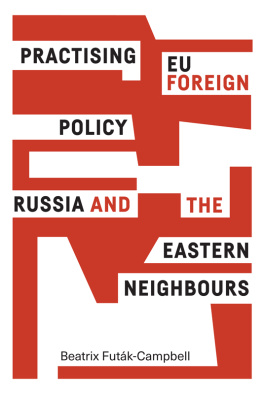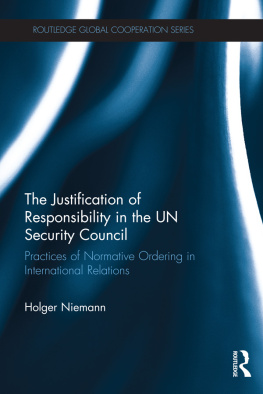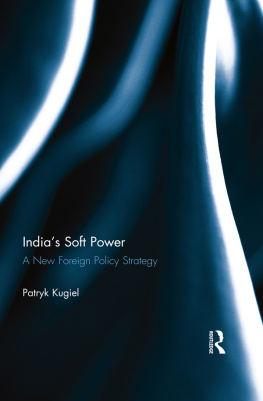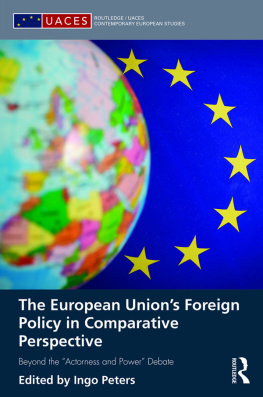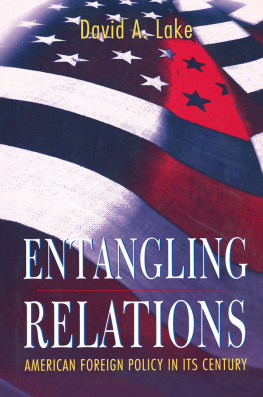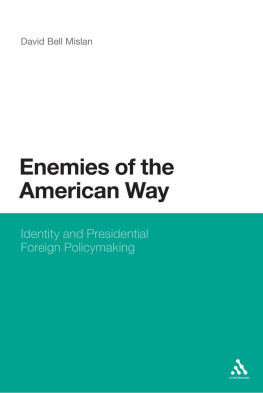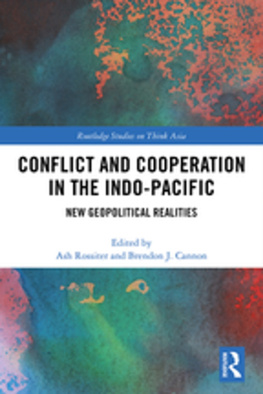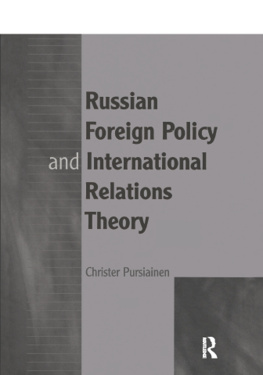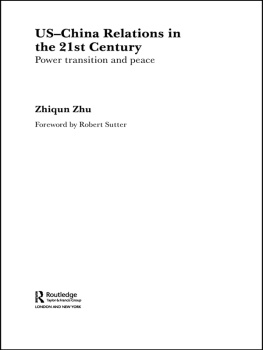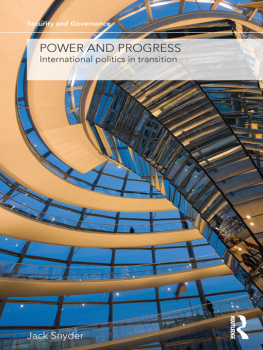David M. McCourt - American Power and International Theory at the Council on Foreign Relations, 1953-54
Here you can read online David M. McCourt - American Power and International Theory at the Council on Foreign Relations, 1953-54 full text of the book (entire story) in english for free. Download pdf and epub, get meaning, cover and reviews about this ebook. year: 2020, publisher: University of Michigan Press, genre: Politics. Description of the work, (preface) as well as reviews are available. Best literature library LitArk.com created for fans of good reading and offers a wide selection of genres:
Romance novel
Science fiction
Adventure
Detective
Science
History
Home and family
Prose
Art
Politics
Computer
Non-fiction
Religion
Business
Children
Humor
Choose a favorite category and find really read worthwhile books. Enjoy immersion in the world of imagination, feel the emotions of the characters or learn something new for yourself, make an fascinating discovery.

- Book:American Power and International Theory at the Council on Foreign Relations, 1953-54
- Author:
- Publisher:University of Michigan Press
- Genre:
- Year:2020
- Rating:3 / 5
- Favourites:Add to favourites
- Your mark:
- 60
- 1
- 2
- 3
- 4
- 5
American Power and International Theory at the Council on Foreign Relations, 1953-54: summary, description and annotation
We offer to read an annotation, description, summary or preface (depends on what the author of the book "American Power and International Theory at the Council on Foreign Relations, 1953-54" wrote himself). If you haven't found the necessary information about the book — write in the comments, we will try to find it.
David M. McCourt: author's other books
Who wrote American Power and International Theory at the Council on Foreign Relations, 1953-54? Find out the surname, the name of the author of the book and a list of all author's works by series.
American Power and International Theory at the Council on Foreign Relations, 1953-54 — read online for free the complete book (whole text) full work
Below is the text of the book, divided by pages. System saving the place of the last page read, allows you to conveniently read the book "American Power and International Theory at the Council on Foreign Relations, 1953-54" online for free, without having to search again every time where you left off. Put a bookmark, and you can go to the page where you finished reading at any time.
Font size:
Interval:
Bookmark:
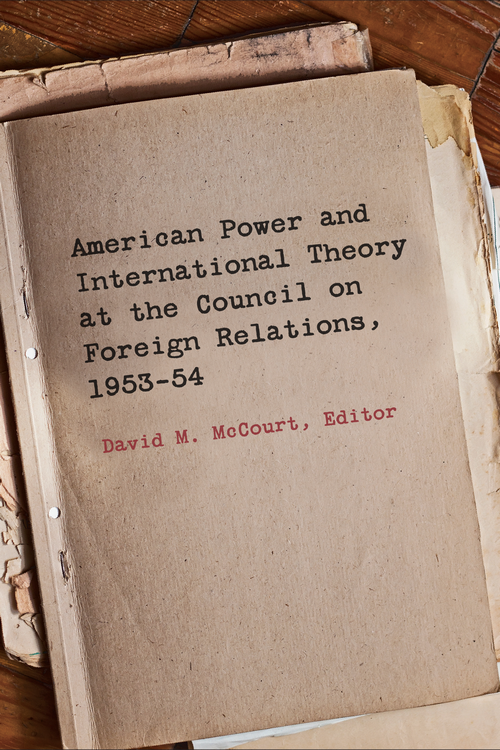
Between December 1953 and June 1954, the elite think tank the Council on Foreign Relations (CFR) joined prominent figures in International Relations, including Pennsylvanias Robert Strausz-Hup, Yales Arnold Wolfers, the Rockefeller Foundations Kenneth Thompson, government advisor Dorothy Fosdick, and nuclear strategist William Kaufmann. They spent seven meetings assessing approaches to world politicsfrom the realist theory of Hans Morgenthau to theories of imperialism of Karl Marx and V. I. Leninto discern basic elements of a theory of international relations.
The study groups materials are an indispensable window to the development of IR theory and illuminate the seeds of the theory-practice nexus in Cold War US foreign policy. Historians of International Relations recently revised the standard narrative of the fields origins, showing that IR witnessed a sharp turn to theoretical consideration of international politics beginning around 1950 and remained preoccupied with theory. Taking place in 195354, the CFR study group represents a vital snapshot of this shift.
This book situates the CFR study group in its historical and historiographical contexts and offers a biographical analysis of the participants. The book includes seven preparatory papers on diverse theoretical approaches, penned by former Berkeley political scientist George A. Lipsky with the digest of discussions from the seven study group meetings. American Power and International Theory at the Council on Foreign Relations, 195354 offers new insights into the early development of IR as well as the thinking of prominent elites in the early years of the Cold War.
David M. McCourt is Assistant Professor of Sociology at the University of CaliforniaDavis.
Edited by David M. McCourt
University of Michigan Press
Ann Arbor
Copyright 2020 by David M. McCourt
Some rights reserved

This work is licensed under a Creative Commons Attribution-NonCommercial-NoDerivatives 4.0 International License. Note to users: A Creative Commons license is only valid when it is applied by the person or entity that holds rights to the licensed work. Works may contain components (e.g., photographs, illustrations, or quotations) to which the rightsholder in the work cannot apply the license. It is ultimately your responsibility to independently evaluate the copyright status of any work or component part of a work you use, in light of your intended use. To view a copy of this license, visit http://creativecommons.org/licenses/by-nc-nd/4.0/
Published in the United States of America by the
University of Michigan Press
Manufactured in the United States of America
First published February 2020
A CIP catalog record for this book is available from the British Library.
Library of Congress Cataloging-in-Publication data has been applied for.
ISBN 978-0-472-13171-6 (hardcover : alk. paper)
ISBN 978-0-472-12638-5 (e-book)
ISBN 978-0-472-90122-7 (open access e-book)
DOI: https://doi.org/10.3998/mpub.11301034
This book is freely available in an open access edition thanks to TOME (Toward an Open Monograph Ecosystem)a collaboration of the Association of American Universities, the Association of University Presses, and the Association of Research Librariesand the generous support of the University of California, Davis. Learn more at the TOME website, available at: openmonographs.org
Cover image courtesy Shutterstock.com
Digital materials related to this title can be found on the Fulcrum platform via the following citable URL:https://doi.org/10.3998/mpub.11301034
Good fortune pervades this volume, perhaps more than most. First, discovery of the documents reproduced here was entirely by accident: I had traveled to Princeton in early 2014 to push forward a project on the role of think tanks in postwar US foreign policy, not the history of International Relations (IR) and the Cold War social sciences. Scrolling through the superbly curated archive of the Council on Foreign Relationsfor which Daniel Linke and all the staff at the Seeley G. Mudd Manuscript Library deserve praiseI was excited beyond reason to see the papers of a Study Group on the Theory of International Relations, 195354. Working with the documents has been a labor of love since, a side project frequently taking me away from my main work on the institutional architecture of American hegemony. I could not have hoped for such a stimulating academic hobby.
Second, the papers would likely have remained just a file on my laptop had it not been for the good fortune of encouragement from Inderjeet Parmar, my favorite scholar of said institutional architecture of American hegemony. Listening to me extol the virtues of the study group records, Inderjeet, against a good deal of hesitation on my part, urged that I seek publication. So too did my longtime friend Jack Gunnell over frequent coffees in Davis, which sadly ended after Jack packed up and headed back to the East Coast. Encouragement and affirmation of the documents interest also came from a group of IR historians who took the time to read the papersand write their own assessmentsfor a roundtable at the 2017 meeting of the International Studies Association in San Francisco. My sincere thanks to Luke Ashworth, Emily Hauptmann, Adam Humphreys, Felix Rsch, Or Rosenboim, Brian Schmidt, Bob Vitalis, and Jon Western.
Colleagues and staff members here in the remarkably congenial Department of Sociology at the University of CaliforniaDavis deserve a note of thanks for their support in all my endeavors. I hope the centrality to the study group of Columbia sociologist Robert MacIver and Dorothy Fosdick of Smith College will provide sufficient evidence that I have not strayed too far beyond the disciplines thankfully porous borders. My IR friendsJon Acuff, Page viii Jack Amoureux, Alex Barder, Dave Blagden, Harry Gould, Jarrod Hayes, Eric Heinze, Andy Hom, Daniel Levine, Mark Raymond, Brent Steele, Michael Struett, Jeremy Youde, and Ayse Zarakolalways deserve thanks.
Third, I was fortunate that the Council on Foreign Relations gave me permission to seek a publisher for the study group records. My sincere appreciation goes to Alysse Jordan, director of library and research services at the Council, for all her efforts.
Preparing the documents for publication would have likely been beyond me, fourth, had it not been for my good fortune in finding Annika Altura to transfer the documents from some poor quality photographs to high quality Word documents. Elizabeth Demers and everyone at the University of Michigan Press were, once again, a joy to work with.
Finally, my good fortune to have such a supportive family should be noted. This book is for Stephanie, Leighton, and Julian.
Over seven months between December 1953 and June 1954, the prestigious think tank the Council on Foreign Relations (CFR) held a study group dedicated to the theory of international relations (IR). The group brought together select members of the CFR and prominent thinkers on international affairs. Some are still well-known to scholars of IR, like Yales Arnold Wolfers and Kenneth W. Thompson from the Rockefeller Foundation. Others have faded from prominence but were influential at the time, such as leading political scientist Robert Strausz-Hup, from the University of Pennsylvania, and Dorothy Fosdick, an early member of the Policy Planning Staff at the State Department before a long career as advisor to Democratic senator Henry Scoop Jackson. Together, the experts collected at the CFR spent some thirty-five hours dissecting a variety of approaches to the study of world politics, from the new realist theory of Hans Morgenthau, to the theories of imperialism of Karl Marx and Joseph Schumpeter, to the psychological perspective of Harold Lasswell. The groups aim was to discern the basic elements of a theory of international relations.
Next pageFont size:
Interval:
Bookmark:
Similar books «American Power and International Theory at the Council on Foreign Relations, 1953-54»
Look at similar books to American Power and International Theory at the Council on Foreign Relations, 1953-54. We have selected literature similar in name and meaning in the hope of providing readers with more options to find new, interesting, not yet read works.
Discussion, reviews of the book American Power and International Theory at the Council on Foreign Relations, 1953-54 and just readers' own opinions. Leave your comments, write what you think about the work, its meaning or the main characters. Specify what exactly you liked and what you didn't like, and why you think so.

